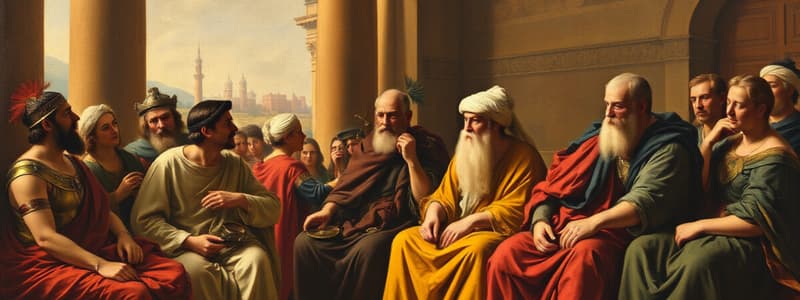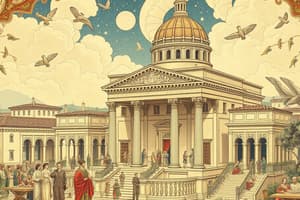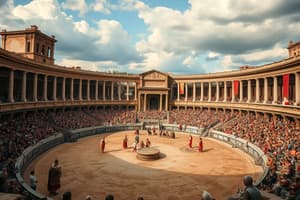Podcast
Questions and Answers
What does the CRAAP test evaluate in sources?
What does the CRAAP test evaluate in sources?
- The professional language used in a document
- The chronological order of events
- The presence of grammatical mistakes
- The credibility of primary and secondary sources (correct)
Which aspect does not contribute to the assessment of professionalism in student work?
Which aspect does not contribute to the assessment of professionalism in student work?
- Constructing a timeline of events (correct)
- Checking for spelling and grammar mistakes
- Using academic language
- Including at least three pieces of direct evidence
Which skill is essential for understanding the context of historical events?
Which skill is essential for understanding the context of historical events?
- Creating a map of physical features
- Explaining the economic growth of states
- Distinguishing between primary and secondary sources
- Detecting different historical points of view (correct)
What is a key component of chronological and spatial thinking?
What is a key component of chronological and spatial thinking?
Which of the following best describes incidental information?
Which of the following best describes incidental information?
What motivated the character's loyalty to Caesar?
What motivated the character's loyalty to Caesar?
Which skill focuses on assessing the credibility of sources and distinguishing fact from opinion?
Which skill focuses on assessing the credibility of sources and distinguishing fact from opinion?
What claim does the character make about his family?
What claim does the character make about his family?
What is the perspective of the character towards Caesar's rule?
What is the perspective of the character towards Caesar's rule?
What does the 'C' in 'CaT CUT' stand for in relation to historical analysis?
What does the 'C' in 'CaT CUT' stand for in relation to historical analysis?
Which question best fits the 'Evaluate' stage of understanding history?
Which question best fits the 'Evaluate' stage of understanding history?
What phrase best represents the mindset of the character after the victory?
What phrase best represents the mindset of the character after the victory?
What underlying tension is suggested between the character and the Senate?
What underlying tension is suggested between the character and the Senate?
What analytical approach looks at both the causes and effects of historical events?
What analytical approach looks at both the causes and effects of historical events?
How does the character justify the conquest of Rome?
How does the character justify the conquest of Rome?
In the context of historical analysis, what does 'Through Their Eyes' encourage historians to consider?
In the context of historical analysis, what does 'Through Their Eyes' encourage historians to consider?
Which statement reflects the character's view on leadership after the conquest?
Which statement reflects the character's view on leadership after the conquest?
What is a key purpose of historical research skills?
What is a key purpose of historical research skills?
What is the emphasis of History Skill 3?
What is the emphasis of History Skill 3?
What question does the character ponder regarding his own potential as a leader?
What question does the character ponder regarding his own potential as a leader?
Which of the following questions is most relevant to the 'Analyze' component of historical investigation?
Which of the following questions is most relevant to the 'Analyze' component of historical investigation?
What should each table group focus on when designing a disguise for a Roman character?
What should each table group focus on when designing a disguise for a Roman character?
Which of the following groups is NOT mentioned as a type of Roman person for whom disguises can be created?
Which of the following groups is NOT mentioned as a type of Roman person for whom disguises can be created?
What is the intended length of the skit that teams must write and perform?
What is the intended length of the skit that teams must write and perform?
What is a requirement for the performance related to the Roman disguise?
What is a requirement for the performance related to the Roman disguise?
In planning the disguise, what type of details should teams aim to find?
In planning the disguise, what type of details should teams aim to find?
What mandatory research topics are indicated for understanding the Roman character?
What mandatory research topics are indicated for understanding the Roman character?
What should the focus be when researching the type of Roman individual assigned to the team?
What should the focus be when researching the type of Roman individual assigned to the team?
Why is researching 'Social Classes of Ancient Rome' crucial for the project?
Why is researching 'Social Classes of Ancient Rome' crucial for the project?
Which type of ship is likely to arrive in London first?
Which type of ship is likely to arrive in London first?
Which civilization is known for having the world's best navy?
Which civilization is known for having the world's best navy?
What primary question does 'Cui bono?' ask in historical context?
What primary question does 'Cui bono?' ask in historical context?
What aspect of society does the question 'Who has the power?' primarily examine?
What aspect of society does the question 'Who has the power?' primarily examine?
In terms of group dynamics, what does 'group membership' influence?
In terms of group dynamics, what does 'group membership' influence?
What common misconception about military power is reflected in the comparison between Rome and Carthage?
What common misconception about military power is reflected in the comparison between Rome and Carthage?
Which of the following best describes the relationship between resources and historical power dynamics?
Which of the following best describes the relationship between resources and historical power dynamics?
What can often be the result of the stories that groups tell themselves?
What can often be the result of the stories that groups tell themselves?
Flashcards are hidden until you start studying
Study Notes
Social Classes of Ancient Rome
- Roman society divided into distinct social classes: patricians, plebeians, equestrians, senators, consuls, and emperors.
- Patricians: Wealthy elite, controlled land and held political power.
- Plebeians: Commoners, farmers, and laborers; had limited rights initially, gained more over time.
- Equestrians: Wealthy non-patricians, involved in commerce and business, could hold certain public offices.
- Senators: Nobles who advised the consuls, part of the ruling class of Rome.
- Consuls: Highest elected officials, two served at a time for one-year terms, held executive power.
- Emperors: Absolute leaders, often came from military or senatorial backgrounds, embodying state authority.
Roman Clothing
- Clothing styles varied significantly by class; indicated status and profession.
- Patricians typically wore togas, symbolizing citizenship; color and draping indicated rank.
- Plebeians generally wore simpler garments, often tunics, less elaborately styled.
- Soldiers (legionnaires) donned military tunics and armor, designed for functionality over fashion.
- Fashion reflected loyalty and identity within their social standing.
Daily Life and Status
- Social status influenced jobs and quality of life; patricians lived in luxury, while plebeians faced hardships.
- Senators engaged in politics and governance, maintaining influence over legislation and community matters.
- Consuls dealt with military affairs and public administration, earning respect and power through successful campaigns.
- Daily life for a plebeian included labor in fields or trades, often struggling economically.
- Freed servants navigated a complex status of being neither fully free nor slaves, often employing skills to gain livelihood.
Research and Presentation Components
- Group disguise project focuses on accurate representation of assigned Roman class.
- Tasks: Design outfit based on researched fashion, plan a skit that illustrates daily life.
- At least one Latin phrase should be integrated to enhance authenticity.
Historical Inquiry and Skills
- Key questions when studying history: What? Where? When? Who? Why? How?
- Essential skills: Analyze events and contexts, distinguish facts from opinions, assess credibility of information, and explore perspectives.
- Key themes include the causes and effects of events, change and continuity, and understanding modern connections to historical events.
Group Dynamics and Ethics
- Decision-making within groups reflects loyalty conflicts, personal gains versus societal obligations.
- Examining major events requires comprehension of perspectives, power dynamics, and stories told by various groups.
- Essential question framing regarding benefits and power illuminates underlying motivations in historical events.
Critical Thinking in History
- Historians analyze cause and effect relationships, various perspectives on past events, and continuity of social constructs.
- Evaluating information through credibility checks and contextual understanding forms a basis for sound historical conclusions.
- Collaborative efforts in group tasks foster discussion and diverse interpretations, reinforcing the richness of historical study.
Studying That Suits You
Use AI to generate personalized quizzes and flashcards to suit your learning preferences.





